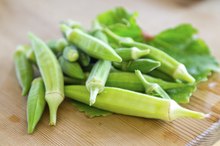Diet for Autoimmune Hepatitis
Autoimmune hepatitis -- a disease in which your immune system targets your hepatocytes, or liver cells -- affects both men and women, although women are more likely to develop this condition. In fact, approximately 70 percent of people with this health problem are female, reports the National Digestive Diseases Information Clearinghouse, or NDDIC. Before using diet to help treat your autoimmune hepatitis, review all diet- and nutrition-related topics with your primary-care provider.
Autoimmune Hepatitis
Approximately 50 percent of people with autoimmune hepatitis have type 1 autoimmune hepatitis, one of two principle types of this condition. Type 1 is more common among North Americans. People with autoimmune hepatitis also have another autoimmune condition, such as Graves' disease, rheumatoid arthritis or inflammatory bowel disease, states the NDDIC. Common signs and symptoms associated with this condition include changes in your urine color, malaise, fatigue, itching, reduced appetite and nausea and vomiting. In some cases, notes the National Center for Biotechnology Information, this condition may progress to liver cirrhosis, which requires a liver transplant.
- Approximately 50 percent of people with autoimmune hepatitis have type 1 autoimmune hepatitis, one of two principle types of this condition.
- In some cases, notes the National Center for Biotechnology Information, this condition may progress to liver cirrhosis, which requires a liver transplant.
Dietary Approach
Are There Foods That Heal Shingles?
Learn More
Certain dietary approaches may be useful in reducing the liver inflammation associated with your autoimmune hepatitis. Carrots, beets and artichokes may be particularly helpful foods for this health purpose, states Phyllis A. Balch, a certified nutritional consultant and author of "Prescription for Nutritional Healing." Consuming a raw fruit and vegetable diet for several weeks may also be beneficial. Important foods, beverages or substances to reduce or avoid include alcohol, sugar, processed and refined foods, raw fish, shellfish, chemicals and food additives.
- Certain dietary approaches may be useful in reducing the liver inflammation associated with your autoimmune hepatitis.
- Consuming a raw fruit and vegetable diet for several weeks may also be beneficial.
Highlighted Food
Carrots may be a helpful food in managing your autoimmune hepatitis symptoms. Carrots, note George Mateljan, a nutritionist, biologist and author of "The World's Healthiest Foods," contain a significant amount of antioxidant compounds, which may be helpful in limiting the amount of liver cell damage caused by autoimmune hepatitis. Other beneficial nutrients contained in carrots include vitamins A, C and K, potassium, manganese, magnesium, phosphorus and folate. Carrots have traditionally been used to improve heart and lung health.
- Carrots may be a helpful food in managing your autoimmune hepatitis symptoms.
- Carrots, note George Mateljan, a nutritionist, biologist and author of "The World's Healthiest Foods," contain a significant amount of antioxidant compounds, which may be helpful in limiting the amount of liver cell damage caused by autoimmune hepatitis.
Considerations
Foods to Eat for Low Blood Count
Learn More
Because autoimmune hepatitis may lead to several serious health complications, including liver cancer, liver failure and liver cirrhosis, you should not delay in seeking treatment if you develop the characteristic signs and symptoms of this health problem. A skilled health-care professional -- especially one who is trained in clinical nutrition -- can counsel you on the merits, drawbacks and limitations of diet and nutrition in treating this condition. Further scientific scrutiny may be necessary to evaluate the true health benefits of certain foods for this health purpose.
Related Articles
References
- National Digestive Diseases Information Clearinghouse: Autoimmune Hepatitis
- "Prescription for Nutritional Healing"; Phyllis A. Balch, CNC; 2010
- "The World's Healthiest Foods"; George Mateljan; 2007
- Basra G, Basra S, and Parudupi S. Signs and Symptoms of Acute Alcoholic Hepatitis. World J Hepatol. 2011 May 27; 3(5): 118–120. doi:10.4254/wjh.v3.i5.118
- Centers for Disease Control and Prevention (CDC). Viral Hepatitis. Apr 8, 2019.
- Krause A, Haberkorn U, Mier W. Strategies for the Treatment of HBV/HDV. Eur J Pharmacol. 2018 Aug 15;833:379-391. doi:10.1016/j.ejphar.2018.06.030
- National Institute of Diabetes and Digestive and Kidney Diseases (NIDDK). Autoimmune Hepatitis.
- Rinella M. Nonalcoholic Fatty Liver Disease: A Systematic Review. JAMA. 2015;313(22):2263-2273. doi:10.1001/jama.2015.5370
- Szabó E, Lotz G, Páska C, et al. Viral Hepatitis: New Data on Hepatitis C Infection. Pathol Oncol Res. 2003;9(4):215-21. doi:PAOR.2003.9.4.0215
- World Health Organization. What Is Hepatitis? July 2018.
Writer Bio
Martin Hughes is a chiropractic physician, health writer and the co-owner of a website devoted to natural footgear. He writes about health, fitness, diet and lifestyle. Hughes earned his Bachelor of Science in kinesiology at the University of Waterloo and his doctoral degree from Western States Chiropractic College in Portland, Ore.









